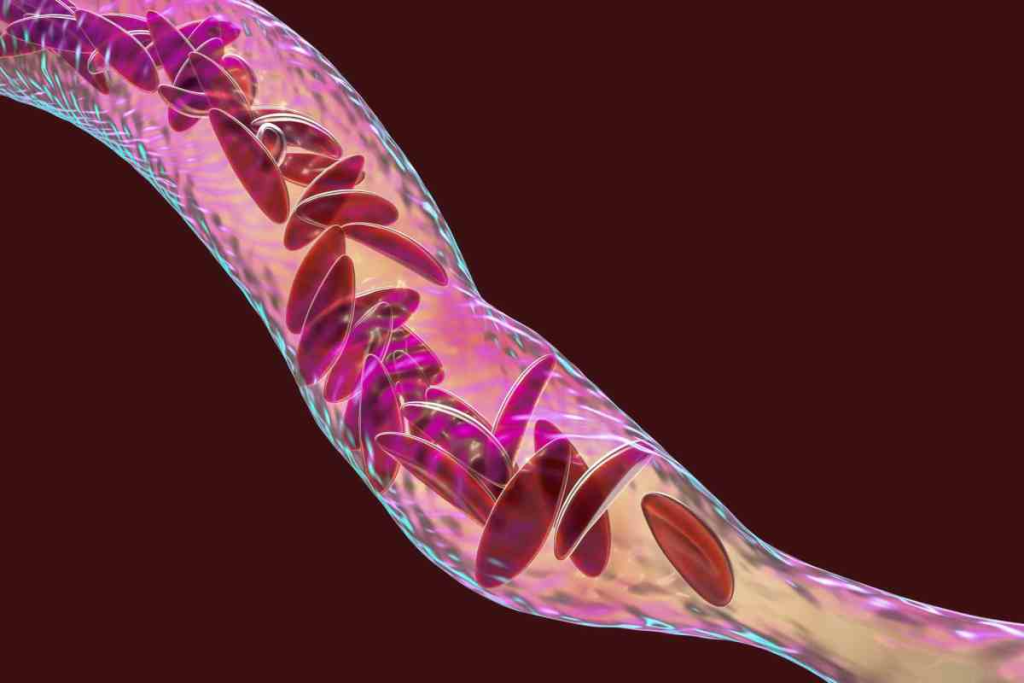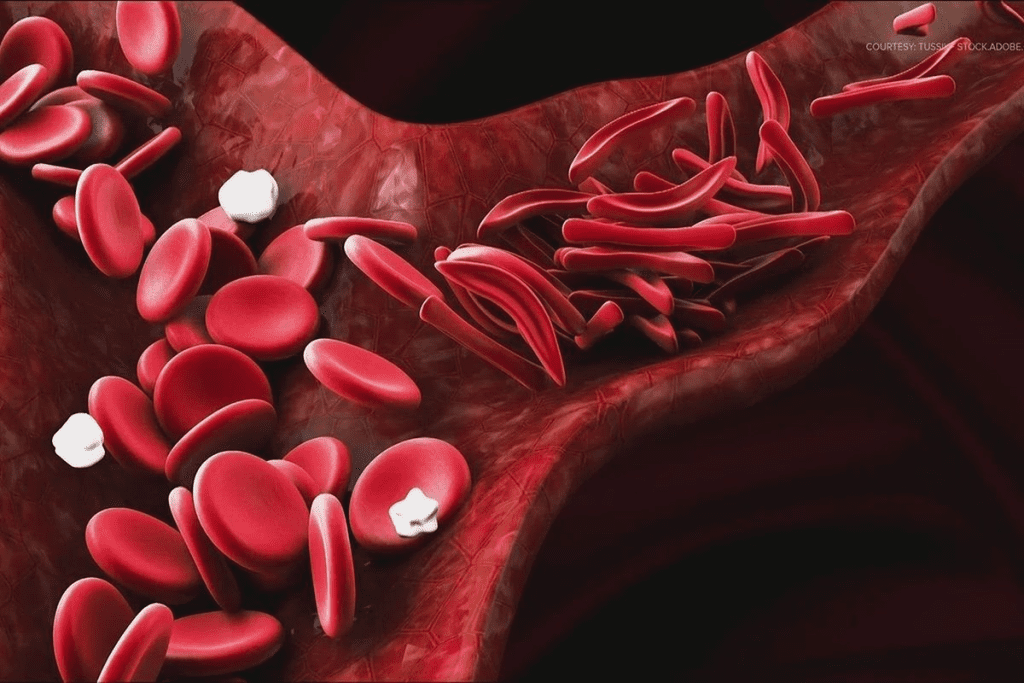Last Updated on November 13, 2025 by
Living with sickle cell disease is tough, and some medicines can make it worse. We know that managing the risks of SCD is key to better lives for those affected.

Some drugs can make sickle cell disease symptoms much worse. They can cause more pain and increase the chance of serious problems. As healthcare experts, we aim to give full support, including to international patients looking for top treatments and guidance on improving life expectancy with sickle cell anaemia.
It’s important to understand sickle cell disease to tackle its complications and provide better patient care. This genetic disorder affects how the body makes hemoglobin, leading to abnormal red blood cells. These cells can block small blood vessels, causing pain and other issues.
In sickle cell disease, abnormal hemoglobin makes red blood cells sickle-shaped. This shape can cause them to get stuck in small blood vessels. This leads to severe pain crises and other problems.
People with sickle cell disease face many symptoms, from mild to severe. These include pain, anemia, and swelling in the hands and feet. Managing the disease well is key to improving their lives.
Sickle cell disease brings many complications, like sickle cell pain crisis, acute chest syndrome, and splenic sequestration. These can be deadly and need quick medical help. The CDC says SCD shortens life by over 20 years, showing the need for full care.
Some common issues include:
Healthcare providers must understand these complications to give the right care to sickle cell patients. By facing these challenges, we can improve patient outcomes and their quality of life.
Certain medications can actually shorten the lives of those with sickle cell anemia. These drugs are meant to ease symptoms but can have serious side effects. It’s important to think about how these drugs affect life expectancy.

Drugs and sickle cell disease have a complex relationship. Some drugs can make the disease worse or cause new health problems. For example, too much pain medication can harm the kidneys or increase infection risks.
Key factors to consider:
People with SCD often live shorter lives than others. The wrong medications can make this worse. For instance, a study found that too many opioids for pain can raise death rates in SCD patients.
Statistics highlighting the issue:
Healthcare providers can improve treatment plans to help SCD patients live longer. Understanding the link between drugs and SCD complications is key.
NSAIDs are commonly used to treat sickle cell disease. They help reduce pain, a big problem for SCD patients. But long-term use can harm the kidneys.
Ibuprofen and naproxen are often given to ease SCD pain. They work well but can hurt the kidneys over time. It’s important to think about the benefits and risks.
SCD can damage the kidneys because of how it affects red blood cells. NSAIDs make this worse by cutting off blood to the kidneys. This can lead to chronic kidney disease, a big problem for SCD patients.
Doctors need to watch kidney health in SCD patients on NSAIDs closely. Regular check-ups and adjusting treatment plans can help reduce risks.
About 38% of SCD patients use NSAIDs for pain. This shows the need to know about the risks, like kidney problems. Teaching patients about safe NSAID use and finding other pain relief methods is key to better care.
Understanding NSAIDs’ role in SCD treatment and their risks helps patients and doctors. Together, they can create treatment plans that help manage pain without harming the kidneys long-term.
Managing pain in sickle cell disease (SCD) is a big challenge. Opioids are both helpful and risky. They work well for severe pain, but can lead to addiction and strict rules.
Opioids are often given to SCD patients for pain. Good pain management is key to a better life for SCD patients. But the dangers of opioids, like addiction and overdose, mean we must be very careful.
For SCD pain, doctors often use morphine, oxycodone, and fentanyl. These drugs help with severe pain but need to be watched closely to avoid problems.
Opioid addiction is a big worry for SCD patients. About 10% might face addiction. This shows we need to watch patients closely and find other ways to manage pain.
“The risk of addiction should not stop us from using opioids for pain in SCD. Instead, we should find a balance that looks at both the good and bad sides.”
Rules to fight the opioid crisis can make it hard for patients to get these drugs. It’s important to find a way to control opioid use while making sure patients get what they need.
Doctors face tough rules to make sure SCD patients get the right pain care. They must deal with these rules to help patients without risking misuse.
Using recreational drugs is very risky for people with sickle cell disease. It can make crises happen more often and be more severe. We will look at how some drugs can badly affect SCD patients.
Cocaine can make blood vessels narrow, raising the risk of vaso-occlusive crises in SCD patients. Vaso-occlusive crises happen when sickled red blood cells block blood vessels. This causes severe pain and can harm organs. Cocaine’s effect on blood vessels makes it very dangerous for SCD patients.
Amphetamines can strain the heart, which is a big worry for SCD patients. The disease already stresses the heart. Amphetamine use can make heart rate and blood pressure go up. This can lead to heart problems. We need to talk about the dangers of amphetamines for SCD patients.
Heroin and fentanyl, being opioids, can cause serious drug interactions. This is true when used with SCD or pain meds. The risk of respiratory depression is high, and overdose is a big worry. We will talk about why it’s important to avoid these drugs to prevent bad outcomes.
For those with sickle cell disease, knowing how alcohol consumption affects them is key. Alcohol can lead to dehydration, which can cause painful crises. We’ll look at how alcohol impacts SCD and how to handle drinking.
Drinking alcohol can cause dehydration, where the body loses more water than it takes in. This is a big problem for SCD patients because it can lead to vaso-occlusive crisis. This is a painful episode where sickled red blood cells block blood vessels. SCD patients should be careful not to get dehydrated when drinking.
To avoid dehydration risks, SCD patients can take these steps:
Drinking alcohol regularly can harm SCD over time. It can damage the liver, which is bad for SCD management. The liver helps filter the blood, and damage can make SCD worse.
Also, alcohol can mess with iron levels, which is a big deal for SCD patients who get blood transfusions often. Too much iron can cause heart and liver problems. So, it’s important to limit alcohol to avoid these issues.
We suggest SCD patients talk to their doctor about drinking. This way, they can make a plan to handle alcohol-related risks. This can help prevent alcohol from making their condition worse.
Sickle cell disease patients face extra health risks from tobacco and smoking. We’ll look at how these habits can make their condition worse and lead to more problems.
Nicotine, a key part of tobacco, harms blood vessels in several ways. Nicotine causes blood vessels to constrict, which can make SCD crises worse. It also makes blood vessels more likely to block.
Nicotine lowers nitric oxide levels in the body. Nitric oxide helps blood vessels relax and widen. With less nitric oxide, blood vessels constrict more, making SCD’s vascular problems worse.
Smoking causes lung problems, and SCD patients are at higher risk. Smoking can cause acute chest syndrome, a serious issue with chest pain, fever, and breathing trouble. It’s a major cause of illness and death in SCD patients.
Smoking and SCD together can increase the risk of pulmonary hypertension. This is when the lung artery blood pressure goes up. It can lead to heart failure and other serious heart problems.
We strongly advise SCD patients to stay away from smoking and tobacco. If they’re already smokers, we suggest they get help to quit. There are many resources, like counselling and medication, that can help them quit smoking.
Managing sickle cell disease well means more than just taking medicine. It’s about making healthy lifestyle choices, too. Knowing which drugs are risky helps patients avoid sickle cell crises and live better lives.
Living with SCD is tough, but we’re here to help. By avoiding harmful drugs and substances, patients can lessen SCD’s impact. This can make a big difference in their health.
We all need to work together to help those with sickle cell disease. Making smart choices about medicine and health can lead to better outcomes. Our aim is to give top-notch care and support, helping patients manage their condition well.
Sickle cell disease can cause many problems. These include pain crises, anemia, infections, and damage to organs. It’s important to know about these to manage the disease well.
NSAIDs can harm the kidneys of SCD patients. Their kidneys are already at risk. Using NSAIDs for a long time can make kidney damage worse.
Opioids can lead to addiction in SCD patients. They are tightly controlled, which can make it hard to get them. About 10% of SCD patients might become addicted to opioids.
Drinking alcohol can make SCD crises worse by dehydrating the body. It can also slow down the disease’s progression over time.
Smoking can make SCD symptoms worse. It also raises the risk of lung problems. Nicotine can harm blood vessels, making the condition worse.
Yes, some medications, like NSAIDs and recreational drugs, can make SCD worse. They can trigger or make pain crises worse and increase the risk of complications.
Managing medication risks needs a detailed plan. This includes careful use of medications and making lifestyle changes. These steps can help SCD patients do better.
Making healthy choices can help SCD patients. Avoiding certain medications, drinking less alcohol, and quitting smoking can improve their life and health outcomes.
Drugs like cocaine, heroin, and amphetamines can be very harmful to SCD patients. They can cause severe pain crises, heart strain, and dangerous interactions with other drugs.
Subscribe to our e-newsletter to stay informed about the latest innovations in the world of health and exclusive offers!